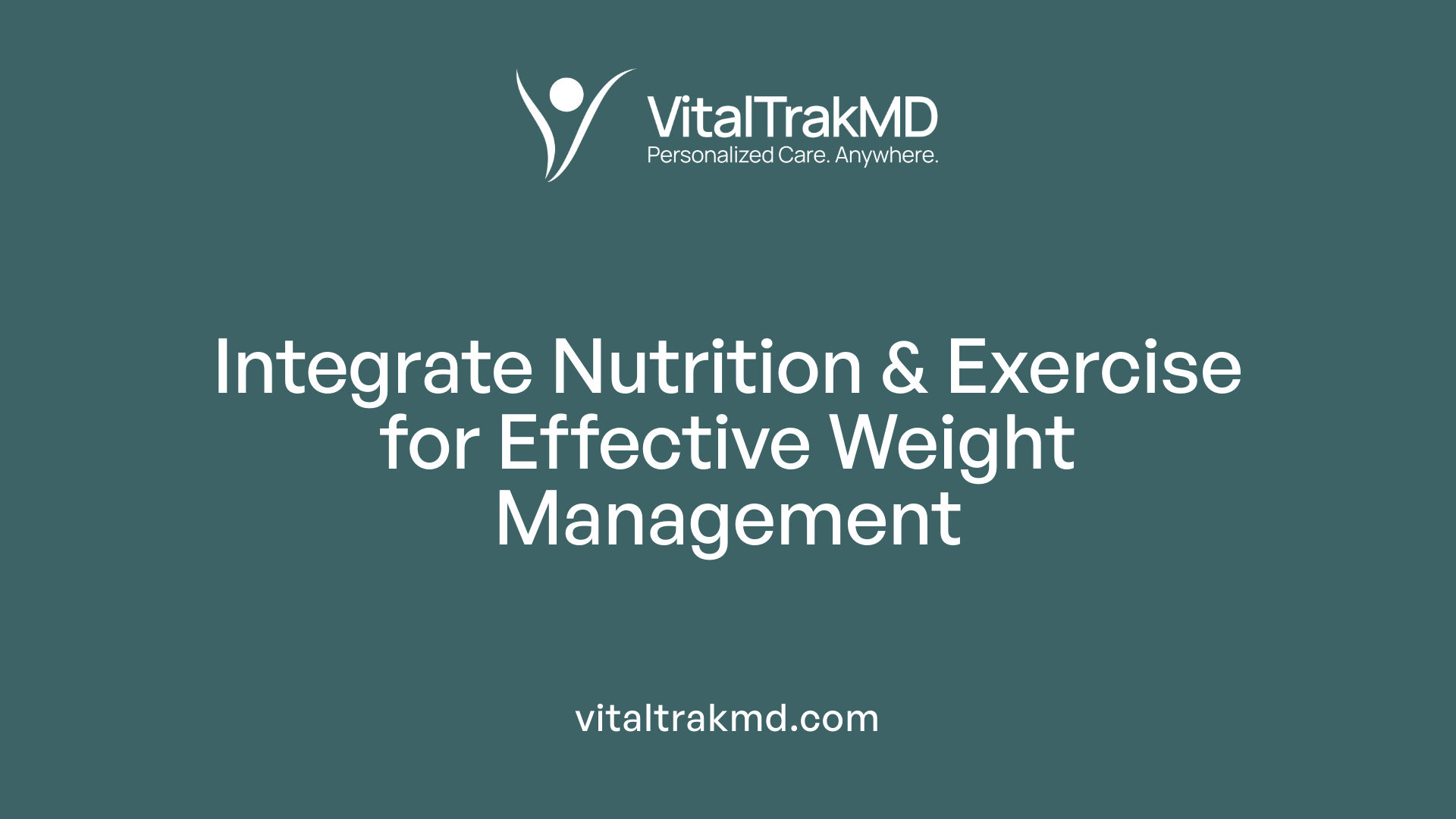Supporting Patients With Practical Strategies for Balanced Nutrition

The Foundation of Weight Management
Achieving and maintaining a healthy weight is a multifaceted challenge that requires more than just dietary changes. This article explores effective strategies for supporting patients through balanced nutrition combined with practical lifestyle modifications. By integrating evidence-based dietary guidance, behavior modification, and mental health support, wellness and care programs can foster sustainable weight management and overall well-being.
Evidence-Based Wellness Programs: Integrating Nutrition and Physical Activity

Characteristics of effective wellness programs
Effective wellness programs for weight loss integrate personalized nutrition plans and physical activity regimens supported by professional guidance. Such programs focus on sustainable lifestyle changes rather than quick fixes, emphasizing gradual progress and long-term maintenance. Incorporation of behavioral strategies, including self-monitoring and environmental adjustments, bolsters adherence and success.
Reduced-calorie balanced diets
Central to these programs are reduced-calorie, balanced diets tailored to individual preferences, cultural needs, and medical conditions. These diets emphasize a variety of fruits, vegetables, whole grains, lean proteins, and low-fat dairy, limiting added sugars, saturated fats, and sodium. Popular diet frameworks include the Mediterranean, DASH, and plant-based diets, which promote nutrient adequacy while facilitating weight loss. Meal replacements and structured hypocaloric plans can aid those needing portion control.
Regular physical activity recommendations
Physical activity is indispensable — guidelines recommend at least 150 minutes of moderate aerobic exercise per week combined with strength training exercises. This combination enhances metabolic rate, preserves lean muscle mass, and improves lipid profiles. Programs encourage enjoyable activities to foster consistency and long-term participation.
Role of registered dietitians and behavioral strategies
Collaboration with registered dietitians ensures nutritional adequacy and customization of meal plans. Behavioral strategies such as goal setting, mindful eating, stress management, and relapse prevention are integral. Self-monitoring tools, including food diaries and digital apps, improve accountability and enable identification of overeating triggers.
Setting realistic, gradual weight loss goals
Realistic goals—such as losing 1 to 2 pounds weekly or achieving 5–10% reduction of initial body weight over six months—promote sustained progress and minimize health risks. Emphasizing mental readiness and motivation enhances commitment to these goals.
Tools for progress tracking and social support
Effective programs employ progress tracking methods such as food and activity logs and use validated tools like hunger scales. Social support from family, peers, or community groups enhances motivation and adherence, fostering a supportive environment for behavior changes.
| Aspect | Details | Benefits |
|---|---|---|
| Nutrition | Balanced, reduced-calorie diets with variety | Promotes nutrient sufficiency and weight loss |
| Physical Activity | ≥150 minutes/week aerobic plus strength training | Preserves muscle mass, improves metabolism |
| Professional Support | Registered dietitians and counseling | Personalized guidance, sustained adherence |
| Behavioral Strategies | Self-monitoring, goal setting, stress management | Enhances accountability and coping skills |
| Goal Setting | 1-2 lbs/week loss, 5-10% weight reduction over 6 months | Realistic, sustainable progress |
| Tools & Social Support | Food/activity diaries, apps, support groups | Motivates adherence and positive lifestyle change |
Sustained Support Through Care Programs for Long-Term Wellness

How do care programs support long-term weight management and overall wellness?
Care programs play a vital role in promoting lasting behavior change crucial for long-term weight management and overall wellness. These programs focus on encouraging healthy eating habits by helping individuals incorporate more fruits, vegetables, and whole grains into their diets while learning portion control techniques to prevent overeating.
Encouraging Healthy Eating Habits and Portion Control
Participants are guided to adopt balanced diets that emphasize nutrient-rich foods and limit intake of added sugars, saturated fats, and excessive sodium. Tools such as food diaries assist in tracking meals and snacks, fostering awareness and accountability. This practical approach enables individuals to manage calorie intake effectively and maintain consistent progress.
Incorporating Physical Activity in Daily Routine
Care programs stress the importance of regular physical activity, recommending at least 150 minutes of aerobic exercise per week combined with resistance training to preserve lean muscle mass. These activities boost metabolism, improve cardiovascular health, and contribute significantly to sustained weight loss.
Ongoing Personalized Counseling and Education
Personalized counseling supports setting realistic, achievable goals, offering tailored advice and motivation. Educational components focus on recognizing triggers for unhealthy behaviors and developing skills to cope with setbacks, reducing relapse risk.
Handling Setbacks and Maintaining Motivation
Programs emphasize mental readiness and motivation, helping participants handle challenges by developing problem-solving skills and stress management strategies. Viewing healthy behaviors as lifelong habits rather than temporary restrictions is vital for continued success.
Developing Positive Habits Including Sleep and Stress Management
Good sleep quality and effective stress management are integrated into care plans, as they influence weight regulation and overall health. Encouraging positive lifestyle changes in these areas enhances well-being and supports long-term adherence.
Environmental Restructuring to Support Healthy Choices
Finally, modifying surroundings—whether at home, workplace, or community—to make healthy choices easier is a cornerstone of these care programs. This can include increasing access to nutritious foods and creating opportunities for physical activity, which reinforce and sustain new healthy habits.
These comprehensive care programs provide the structure, support, and education needed to help individuals maintain weight loss, improve health outcomes, and reduce risks associated with obesity over time.
Mental Health: A Pillar of Successful Weight Loss and Wellness

What role does mental health play in wellness and weight loss programs?
Mental health is fundamental in shaping behaviors crucial to weight management and overall wellness. Psychological factors like stress, depression, and concerns about body image directly affect eating habits and motivation levels. These elements influence an individual's ability to adopt and maintain healthy lifestyle changes necessary for weight loss.
How does mental health affect adherence to weight management plans?
Poor mental health can lead to emotional eating, reduced motivation, and difficulty adhering to diet and exercise routines. Conversely, positive mental health supports self-efficacy and persistence, which are key for long-term behavioral change. Monitoring mental well-being throughout weight management helps identify challenges before they lead to relapse or weight regain.
What benefits do behavioral interventions provide for mental well-being?
Behavioral weight management programs commonly include techniques such as goal setting, self-monitoring, and stress management. These not only assist in controlling eating behaviors but also improve psychological outcomes like reduced depression and anxiety. Improved mental well-being reinforces commitment to lifestyle changes.
Why is ongoing mental health monitoring important during weight loss?
Weight loss efforts can sometimes exacerbate stress or mood disturbances. Regular assessment helps ensure that individuals receive timely support to address emotional difficulties. This proactive approach prevents setbacks and encourages sustained progress.
How do support groups and psychological treatments contribute?
Engagement in support groups promotes social connectedness, reduces feelings of isolation, and enhances motivation. Psychological treatments like cognitive behavioral therapy can directly target dysfunctional thought patterns, improving coping skills and self-esteem, which are essential for managing weight-related challenges.
What is the value of holistic approaches addressing both mental and physical health?
Addressing mental health alongside physical health leads to more comprehensive care. Such integrative strategies recognize the interplay between mind and body, ultimately promoting sustained wellness and more effective weight loss outcomes. By considering emotional and psychological needs, weight management programs become more personalized and successful.
Nutritional Principles for Balanced Diets in Weight Management
Caloric Balance and Energy Management
Maintaining a healthy weight hinges on balancing calorie intake with energy expenditure. Consuming the right amount of calories for your activity level helps prevent unwanted weight gain or loss. Reduced-calorie meal plans creating a deficit of 500-1000 kcal daily typically lead to weight loss of about 1-2 pounds per week. Distributing calories over 4-5 meals/snacks daily, including breakfast, supports metabolic rate and satiety.
Variety of Nutrient-Dense Foods
A balanced diet for weight management emphasizes incorporating a wide range of nutrient-rich foods. Aim to include at least five portions of fruits and vegetables daily—fresh, frozen, canned (without added sugars or salt), dried, or juiced forms—to supply essential vitamins and minerals. Starchy carbohydrates should make up just over a third of food intake, focusing on higher-fiber or wholegrain options which promote fullness and contain fewer calories than fats. Whole grains also provide important nutrients and aid digestion.
Role of Lean Proteins, Seafood, Legumes, Nuts, and Seeds
Including a variety of protein sources supports muscle maintenance and overall health during weight management. High-quality proteins such as seafood (with emphasis on oily fish for omega-3 fatty acids), lean meats, eggs, legumes, soy products, nuts, and seeds supply essential amino acids and help preserve lean muscle mass, particularly when combined with physical activity.
Limiting Added Sugars, Saturated Fats, Trans Fats, and Sodium
Reducing intake of free sugars—including added sugars, honey, syrups, and fruit juices—is vital to avoid excess calorie consumption and reduce obesity risk. Saturated fats found in fatty meats, butter, hard cheeses, and cream should be limited to lower cholesterol and cardiovascular disease risk. Trans fats should be avoided due to their negative health effects. Additionally, sodium intake should be capped at no more than 6 grams daily to manage blood pressure.
Hydration and Healthier Drink Choices
Adequate hydration is fundamental for wellness and assists in appetite regulation. Prefer water, lower-fat milk, tea, and coffee without excessive sugar over sugary drinks, which add unnecessary calories. Choosing healthier drinks supports weight management without compromising hydration.
Use of Dietary Resources Like USDA Food Guide Pyramid
The USDA Food Guide Pyramid offers practical guidance for structuring a nutritionally balanced, hypocaloric diet suitable for weight management. It emphasizes consuming varied food groups in appropriate proportions and encourages mindful portion control, making it a helpful tool for individuals aiming to lose or maintain weight.
Healthy Cooking Methods and Meal Replacements
Selecting cooking methods such as baking, grilling, or steaming rather than frying helps reduce calorie density while preserving nutrient quality. Meal replacement options like liquid meals, meal bars, or calorie-controlled packaged meals serve as effective aids for portion control, sustaining weight loss, and establishing healthier eating patterns when integrated into comprehensive lifestyle changes.
Behavioral Strategies: Self-Monitoring and Portion Control

How does self-monitoring of food intake and physical activity support weight management?
Self-monitoring is a fundamental behavioral strategy in weight management programs. By tracking food intake and physical activity, individuals develop accountability and gain insight into their eating patterns and exercise habits. This awareness helps identify behaviors contributing to overeating or inactivity, enabling more informed decisions that support weight loss and maintenance.
What role do food diaries and hunger scales play in behavioral weight management?
Using tools like food diaries allows individuals to record meals and snacks, helping them stay within their caloric needs and adhere to balanced eating plans. Hunger scales guide understanding of true hunger versus emotional cues, promoting healthier decisions about when and how much to eat. These tools facilitate mindfulness and goal orientation in daily food choices.
How can mindful eating practices prevent overeating?
Mindful eating involves paying careful attention to each bite, avoiding distractions such as television or smartphones during meals. This practice helps individuals recognize satiety signals more effectively, reducing the likelihood of overeating. Focusing on food enjoyment and portion sizes supports healthier eating habits and contributes to better weight control.
What practical tips assist with portion control and understanding serving sizes?
Effective portion control strategies include using smaller plates, measuring servings, and familiarizing oneself with standard portion sizes. Understanding food labels and employing visual cues (like a handful representing a serving of nuts) help manage intake. Consistently applying these methods supports caloric balance and prevents unintentional overeating.
How does tracking emotional eating triggers aid in weight management?
Emotional eating often leads to consuming excess calories in response to stress or mood changes. Tracking these triggers enables individuals to recognize patterns and develop alternative coping strategies such as physical activity or relaxation techniques. This awareness contributes to breaking the cycle of emotional overeating and supporting sustained weight control.
What benefits do meal replacement programs offer for portion control?
Meal replacement programs provide controlled portions through products like liquid meals, bars, or calorie-controlled packaged meals. They simplify portion management, reduce guesswork, and support establishing healthier eating patterns. Such programs have been shown to aid in weight loss maintenance by promoting consistency and helping individuals adhere to caloric goals.
| Strategy | Description | Benefit |
|---|---|---|
| Self-Monitoring | Tracking food and activity | Increased awareness and accountability |
| Food Diaries | Recording meals/snacks | Supports calorie control and balanced eating |
| Hunger Scales | Assessing true hunger before eating | Prevents unnecessary snacking |
| Mindful Eating | Focusing on meals without distractions | Reduces overeating by recognizing satiety |
| Portion Control Tips | Using smaller plates and measuring servings | Controls calorie intake effectively |
| Emotional Eating Tracking | Identifying triggers and alternative coping mechanisms | Helps break emotional overeating cycles |
| Meal Replacement | Using controlled-calorie products | Simplifies portion control, aids weight loss |
Physical Activity: Essential for Weight Loss and Metabolic Health
What Role Do Aerobic and Resistance Exercises Play in Weight Management?
Aerobic exercises, such as walking, running, and cycling, are key for burning calories and improving cardiovascular health. Resistance training, including weight lifting and bodyweight exercises, helps preserve and build lean muscle mass. Combining both types of exercise boosts overall fat loss and supports a stronger metabolism.
How Does Physical Activity Benefit HDL Cholesterol and Lean Muscle Mass?
Regular exercise increases high-density lipoprotein (HDL) cholesterol, often called "good cholesterol," which contributes to better heart health. Resistance exercises specifically help maintain muscle mass during weight loss, preventing the metabolic slowdown that often accompanies fat loss.
Why is Sustaining an Exercise Program Crucial for Long-Term Weight Management?
Long-term success in managing overweight and obesity heavily depends on maintaining consistent physical activity. Studies show that those who continue exercising are more likely to keep weight off, as exercise helps regulate appetite and maintain energy balance.
What Are the Recommendations for Weekly Physical Activity?
Adults are generally encouraged to engage in at least 150 minutes of moderate-intensity or 75 minutes of vigorous-intensity aerobic activity per week, plus muscle-strengthening activities on two or more days. Following these guidelines supports weight loss and overall health.
Why Include Strength Training to Improve Metabolic Rate?
Incorporating strength training increases muscle mass, which elevates resting metabolic rate (RMR). A higher RMR means the body burns more calories at rest, making it easier to maintain weight loss and prevent future weight gain.
Regular physical activity, blending aerobic and resistance training, is foundational to effective weight management and improved metabolic health.
Lifestyle and Environmental Modifications to Sustain Healthy Habits
Creating a supportive home, workplace, and community environment
Environmental restructuring plays a crucial role in weight management. Modifying surroundings to encourage healthier eating and increase physical activity opportunities helps make beneficial choices easier. Examples include stocking homes with fruits and vegetables, promoting active breaks at work, and developing community spaces that support walking and exercise.
Incorporating enjoyable, healthful foods into lifestyle
Enjoyable, healthful foods are the cornerstone of lasting dietary change. Including a variety of fruits, vegetables, lean proteins (like seafood, legumes, and nuts), and whole grains ensures balanced nutrition while supporting weight control. Portion control and meal planning can help maintain calorie balance without sacrificing flavor or satisfaction.
Reducing calorie intake through food choices such as whole grains and high-fiber foods
Whole grains and high-fiber foods help reduce calorie intake by increasing satiety and slowing digestion. Choosing these foods over refined carbohydrates and limiting added sugars and saturated fats helps create a caloric deficit needed for weight loss or maintenance. Examples include brown rice, oats, whole wheat bread, and legumes.
Managing stress and emotional health
Stress and emotional well-being strongly impact eating behaviors. Integrating stress management techniques such as mindfulness, regular physical activity, and social support can help prevent emotional eating, improve self-monitoring, and sustain positive lifestyle habits.
Adopting healthy mindset shifts regarding lifelong habits
Viewing healthy behaviors as lifelong habits, rather than temporary restrictions, promotes sustained weight management. Emphasizing gradual, realistic goal setting and focusing on long-term lifestyle changes strengthens motivation and resilience against setbacks.
Role of social support and community programs
Support systems including counseling, family involvement, community programs, and digital services improve adherence to healthy behaviors. They foster accountability, provide encouragement, and offer resources that facilitate ongoing engagement and success in weight management efforts.
A Holistic Approach to Balanced Nutrition and Wellness
Supporting patients with balanced nutrition requires a comprehensive strategy that goes beyond diet alone. Combining evidence-based dietary guidelines with physical activity, behavioral tools, mental health support, and environmental modifications creates a foundation for sustainable weight management and overall wellness. Care programs that personalize guidance, encourage realistic goals, and provide ongoing support have the greatest potential to enable lasting lifestyle changes. Emphasizing mental well-being alongside physical health ensures patients can stay motivated and resilient throughout their wellness journey. Ultimately, adopting practical strategies that integrate nutrition, movement, and psychological health empowers patients to achieve balanced nutrition and improved quality of life.
References
- Weight-Loss and Maintenance Strategies
- Tips for Healthy Eating for a Healthy Weight
- Weight loss: 6 strategies for success
- Strategies for Success
- Weight Management: Evidence-Based Nutrition Strategies
- 8 tips for healthy eating
- The 9 Best Diet Plans: Sustainability, Weight Loss, and More
- The 5 Best Weight Loss Programs in 2025
- Choosing a Safe & Successful Weight-loss Program - NIDDK
- The impact of adult behavioural weight management ...
Recent articles
Want to Feel Better and Live Healthier?
Join hundreds of patients taking control of their health with personalized care that fits their life – not the other way around.
Rated 4.8/5 by 32+ customers







